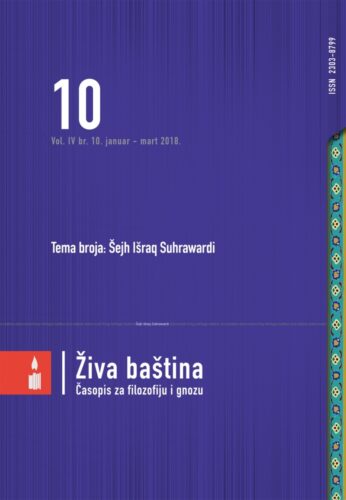UDK 28-23 : 28-852.5
Ovaj rad rasvjetljava prisutnost i filozofske interpretacije kur’anskih stavaka u Suhravardījevom poznatom djelu Hikmetul-išrāk, posredno ukazujući na odnos islamske filozofije prema islamskoj Objavi. Primjetno je da je ovaj aspekt Suhravardījeve filozofije u sjeni drugih filozofskih rasprava, što nas je opredijelilo za pisanje ovog članka uz korištenje povijesne i hermeneutičke metode. Na početku smo naveli kratku Suhravardījevu biografiju, uz nešto širi popis literature o njemu na bosanskome jeziku, prikazali odnos Kur’ana i islamske filozofije, odnosno Suhravardīja, a zatim njegove interpretacije kur’anskih ulomaka redoslijedom koji je ustanovljen u spomenutom djelu. Na dva mjesta prikazan je direktni utjecaj kur’anskih mudrosti na spoznaje islamske filozofije o Božijem Znanju i eshatologiji. Interesantno je da će Suhravardī posegnuti za citiranjem kur’anskih riječi da pokaže kako je Platonovo uvjerenje blisko islamskome naučavanju, kao i za kur’anskim pojmovljem u govoru o mističkoj potrazi. Zaključno, Suhravardī citira, partikularno, dvadeset i tri ajeta, a tumači ih njemu omiljenom te’vīl metodom, razvijajući višeslojne interpretacije koje će trajno oblikovati drugu od tri glavne filozofske škole u krilu islamske filozofije.
Ključne riječi: kur’anski stavci, Suhravardī, ikmetul-išrā , islamska filozofija, te’vīl
Abstract
Presence and interpretation of verse of Qur’an in Suhrawardī’s work Hikmetul-Ishrāk
The paper sheds light on the presence and philosophical interpretations of verses of Qur’an in Suhrawardi’s well known work Hikmetul-ishrāk indirectly by pointing to the relations between Islamic philosphy towards the Book of Islam. It is evident that this aspect of Suhrawardi’s philosophy is in the shadow of other philosophical discussions, which motivated us to write this paper by applying the historic and hermenautic methods. At the beginning, a short biography of Suhrawardi is offered with a wider list of books about him written in Bosnian language, the relation between Qur’an and Islamic philosophy, i.e. Suhrawardi, is presented, followed by his interpretations of parts of Qur’an in the order in which they were presented in the mentioned book. In two places, the paper presents a direct impact of Qur’an’s wisdom on the knowledge of the Islamic philosophy, about God’s Knowledge and eshatology. Interestingly, Surhawardi quoted words of Qur’an to demonstrate that Plato’s belifs were close to the teaching of Islam, as well as terminology of Qur’an in his speech about mystical quest. As a conclusion, Suhrawardi quotes twenty three ayahs and interprets them with his favourite te’vīl method, by developing multi-layered interpretations which will permanently shape the second of the three main philosophical schools of Islamic philosophy.
Keywords: verses of Qur’an, Suhravardī; hikmetul-ishrāk; Islamic philosophy; te’vīl.
[tags]

